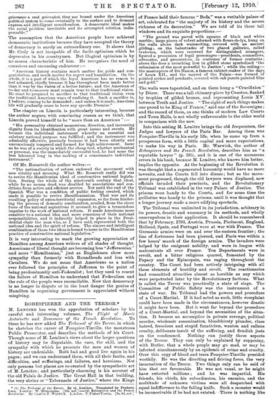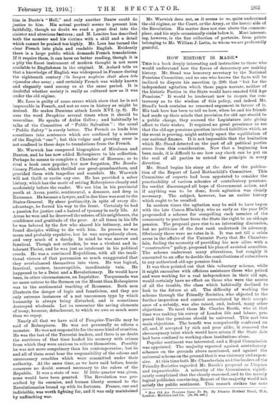ROBESPIERRE AND THE TERROR.*
M. LENeTBE has won the approbation of scholars by his careful and interesting volumes, The Flight of Marie Antoinette and Romances of the French Revolution. To these he has now added The Tribunal of the Terror, in which he sketches the career of Fouquier-Tinville, the monstrous Public Prosecutor, and describes the methods of his Court. Though some of M. Lenotre's views about the larger questions of history may be disputable, the care, the skill, and the sympathy with which he presents the men and women of history are undeniable. Both bad and good live again in his pages; and we can understand them, with all their faults, and difficulties, and sufferings, and failures, and heroisms. Not only persons but places are re-created by the sympathetic art of M. Lenotre; and particularly charming is his account of the old Palais de Justice. The Great Hall in that building, the very shrine or " Tabernacle of Justice," where the Kings • (1) The Tribal:44_4y the Terror. By G. Leah*. Translated by Frederic Lees. London W. Heinemann. [10s. net.]—(2) Robespierre and the French Revolution. By Charles F. Warwielr. Lond-on : T. FishertTnwin. [Se. 6d. net.;
of France held their famous "Beds," was a veritable palace of art, celebrated for " the majesty of its history and the severe richness of its decoration." We are told of its three tall windows and its exquisite proportions :— " The ground was paved with squares of black and white marble; large pieces of velvet adorned with fleurs-de-lys, bung on the walls above dark wainscoting, oovered with an ancient gilding ; on the balustrades of two glazed galleries, called lanternes, which were reserved for distinguished strangers, figured a procession of legal personages—presidents, counsellors, advocates, and procurators, in costumes of former centuries ; above the door a crouching lion in gilded stone symbolised the submission of the most powerful to Justice' ; while the ceiling-- the masterpiece of Du Hanon, a famous cabinet-maker of the days of Louis XII., and the marvel of the Palais—was formed of' pointed arches and pendants, covered with oak panels painted blue and gold."
The walls were tapestried, and on them hung a " Crucifixion " by Dilrer. There was a tall chimney-piece by Constou, flanked by trophies of gilded bronze, and representing Louis XV. between Truth and Justice. " The sight of such things makes one proud to be King of France," said one of the Sovereigns ; and the record of them, as one thinks of modern Law Courts and Town Halls, is not wholly unfavourable to the older world in comparison with the new. • Into this setting M. Lenotre brings the old frequenters, the Judges and lawyers of the Paris Bar. Among them was Fouquier-Tinville in his early life, when he came up from a prosperous farm, with a little capital and more expectations, to make his way in Paris. Mr. Warwick, the author of Robespierre and the French Revolution, describes him as " a reputable lawyer" (p. 385), and it is one of the numerous errors in his book, because M. Lenotre, who knows him better, implies the opposite. At the beginning of the Revolution it was thought that a regenerated humanity would have no more lawsuits, and the Courts fell into disuse ; but as the move- ment progressed, though the old lawyers were displaced, new officials invaded their precincts, and the Revolutionary Tribunal was established in the very Palace of Justice. The prisons were handy to the Courts, and for some time the guillotine was bandy to the prisons, until it was thought that a longer journey made a more edifying spectacle.
The Tribunal was unlimited in its jurisdiction, arbitrary in its powers, drastic and summary in its methods, and wholly unscrupulous in their application. It should be remembered that by February, 1793, Austria, Prussia, Piedmont, England, Holland, Spain, and Portugal were at war with France. The Germanic armies were on and over the eastern frontier ; the
line of fortresses had been pierced, and Paris was within a few hours' march of the foreign armies. The invaders were helped by the emigrant nobility, and were in league with malcontents all over France. Ten Departments were in revolt, and a bitter religious quarrel, fomented by the. Papacy and the Episcopate, was raging throughout the
country. The Court had been actively intriguing with all these elements of hostility and revolt. The reactionaries had committed atrocities almost as horrible as any which were perpetrated later by the Revolutionary factions. What is called the Terror was practically a state of siege. The Committee of Public Safety was the instrument of a state of war. Its Tribunal had the powers and procedure of a Court-Martial. If it had acted as such, little complaint could have been made in the circumstances, however drastic it might have been. But it went far beyond the procedure of a Court-Martial, and beyond the necessities of the situa- tion. It became an accomplice in private revenge, political murder, wholesale assassination, bloodthirsty plunder, class hatred, ferocious and stupid fanaticism, wanton and callous cruelty, deliberate insult of the suffering, and fiendish jests on the condemned. Nothing can justify these aspects of the Terror. They can only be explained by supposing, with Butler, that a whole people may go mad, or may be infected simultaneously by an epidemic of crime and cruelty. Over this orgy of blood and tears Fouquier-Tinville presided
worthily. He was the directing and driving force, the very incarnation of the Terror. Two things only, can be said of him that are favourable. He was not venal, or he might
have extorted millions ; and he was. impartial. His friends, his chiefs, his subordinates, his enemies, and the multitude of unknown victims were all despatched with equal indifference to the falling knife. Such a monster would be inconceivable if he had not existed. • There is nothing like him in Dante's " Hell," and only another Dante could do justice to him. His actual portrait seems to present him faithfully, though no doubt we read a great deal into the sinister and atrocious features ; and M. Lenotre has described both the monster and his victims with a skill and a detail
which cannot be praised too highly. Mr. Lees has turned the
clear French into plain and readable English. Evidently there is a large public which demands French translations.
If it require them, it can have no better reading, though it is a pity the finest instrument of modern thought is not more available to Englishmen in the original. M. Aulard tells us that a knowledge of English was widespread in France during
the eighteenth century (la longue anglaise etait alors his repanclue chez nous) ; and certainly French was widely known
and elegantly used among us at the same period. It is doubtful whether society is really as cultured now as it was under the old regime.
Mr. Lees is guilty of some errors which show that he is not impeccable in French, and not so sure in history as might be
desired. He makes Damiens attack Louis XVI. (p. 8). He uses the word Dauphine several times when it should be masculine. He speaks of Auks Genus ; and habitually he talks of the Committee of " Public Salvation " : the usual Public Safety" is surely better. The French on leads him sometimes into sentences which are confused by a misuse of the English "one"; but this vulgar and growing error is not confined in these days to translations from the French.
Mr. Warwick has composed biographies of Mirabeau and Denton, and he has now added Robespierre to his collection. Perhaps he means to complete a Chamber of Horrors ; or to rival a book once popular, but now forgotten, The Revolu- tionary Plutarch, which thrilled our great-grandmothers, and provided them with tragedies and scandals. Mr. Warwick will not thrill or excite any one. He has provided a sober history, which has the merit of setting Robespierre clearly and moderately before the reader. We see him in his provincial youth at Arras, poetic, sentimental, a dreamer, and deep in Rousseau. He became a lawyer, and in due time was sent to the States-General. By sheer pertinacity, in spite of every dis- advantage, be forced his way to the front. Certainly he had a passion for justice and a hatred of tyranny in early life. At Arras he won and he deserved the esteem of his neighbours, the confidence and gratitude of the poor. At all times in his life he was beloved by the few who shared his intimacy, and he found disciples willing to die with him. In person he was mean and probably repulsive, but he was scrupulously clean, and very much of a dandy. In mind he was narrow and fanatical. Though not orthodox, he was a virulent and in- tolerant Theist, and he was just as intolerant in his political creeds. He was a convinced Republican, with all the tradi- tional virtues of that persuasion so much exaggerated that they overbalanced themselves into vices. He was logical, fanatical, austere, incorruptible, inordinately vain. He happened to be a Deist and a Revolutionary. He would have been, in other circumstances, an Inquisitor. Torquemada was no more untrue to the Sermon on the Mount than Robespierre was to the sentimental teaching of Rousseau. Both men illustrate the danger of logic and fanaticism, and they are only extreme instances of a not uncommon type by which humanity is always being disturbed, and is sometimes destroyed wholesale. Let us remember the saving elements of irony, humour, detachment, to which we owe so much more than we repay.
Nearly all that we have said of Fouquier-Tinville may be said of Robespierre. He was not personally so odious a monster. He was not responsible for the same kind of cruelties. He was the last of the Terrorist leaders, and there is no doubt the survivors of that time loaded his memory with crimes from which they were anxious to relieve themselves. Possibly he was not more sanguinary than his contemporaries ; but he and all of them must bear the responsibility of the odious and unnecessary cruelties which were committed under their authority. At the same time, as we have said before, heroic measures no doubt seemed necessary to the rulers of the Republic. It was a state of war. If little quarter was given, none would have been granted. The Revolution was pro- scribed by its enemies, and human liberty seemed to the Revolutionaries bound up with its fortunes. France, one and indivisible, was worth fighting for, and it was only maintained by unflinching war.
Mr. Warwick does not, as it seems to us, quite understand the old regime, or the Court, or the Army, or the heroic side of the Revolution. His matter does not rise above the, common- place, and his style occasiorially sinks below it. Most interest- ing, however, is the fine collection of portraits, from prints belonging to Mr. William J. Latta, to whom we are profoundly grateful.











































 Previous page
Previous page